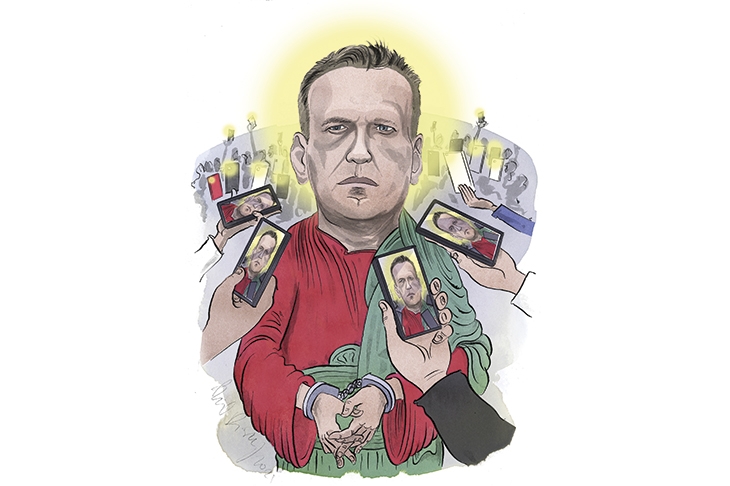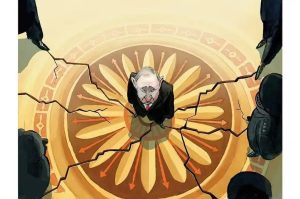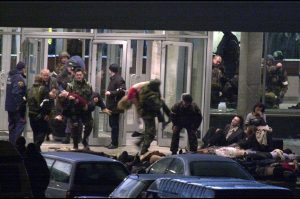There was a time before the invasion of Ukraine when even the Kremlin’s opponents would talk of living in “vegetarian” times. Before 2022, independent news organizations like Dozhd TV, the New Times and Novaya Gazeta were marginalized but not banned. Public protest was punished, but for the most part with sentences in days and months, not years or decades. Even Alexei Navalny, the opposition’s highest profile leader, received a highly unusual suspended sentence after his conviction on trumped-up fraud charges in 2013. He remained free to goad the Kremlin with videos detailing massive corruption and run candidates in local elections until his poisoning by Russian secret police in August 2020.
Save your skin and fight on, or keep your honor and be buried in the prison system? There’s no easy answer
Times have changed. Earlier this month activist Vladimir Kara-Murza was convicted of treason and sentenced to a staggering twenty-five years in jail. Local councillor Ilya Yashin lost his appeal against an eight-and-a-half-year sentence for “discrediting the military.” Navalny himself, in jail since his return to Russia in January 2021 after recovering from Novichok poisoning in Berlin, served his twelfth spell in solitary confinement this month, was beaten up by prison guards and suffered sudden weight loss and acute stomach pain that made his allies suspect another attempt at slow poisoning. “They are killing Navalny in prison,” said his associate Maria Pevchikh.
Putin’s machine of repression has become fully carnivorous — though the Kremlin has so far resisted calls from parliamentarians and propagandists to reinstate the death penalty for treason. No prominent opposition politician or journalist remains at liberty in Russia. Even Kara-Murza’s defense lawyer Vadim Prokhorov fled the country before the sentence was handed down for fear of suffering his client’s fate.
Navalny, Yashin and Kara-Murza could have fled abroad too, but chose not to. Navalny returned to face near-inevitable arrest because, as he explained to journalists who crowded on to his Berlin-Moscow flight: “I am Russian, my place is in Russia… I have no choice but to return.” Alexei Gorinov, Ilya Yashin’s fellow local councillor in suburban Moscow, was arrested and convicted after refusing to discuss the planning of municipal children’s events at a time when “children are being killed in Ukraine.” Gorinov’s arrest was a clear warning to Yashin himself to get out. The authorities “want me to shut up or to emigrate like many of my friends,” Yashin explained to journalist Mikhail Fishman — who had by that time fled to Tel Aviv — last May. “I ignore these warnings. I understand perfectly the threat that I am under. [But] if an anti-war voice sounds from inside the country it’s much more powerful, much louder… It also robs authorities of the argument that those who are against have all left and are all traitors to the nation.”
Russia’s three most prominent political prisoners are more than just victims of the regime. They are martyrs in the sense that, Christ-like, they deliberately chose not to save themselves from destruction. In his May interview Yashin referred to Anna Akhmatova’s poem “Requiem,” perhaps the most moving testament to the horror of Stalin’s terror: “No, not under the vault of alien skies/ And not under the shelter of alien wings/ I was with my people then/ There, where my people, unfortunately, were.” For Russia’s modern martyrs, their political credibility is inextricably linked to their moral standing — which means remaining with their people, and suffering the consequences of their beliefs “on their own hide.”
Navalny, Yashin and Kara-Murza’s self-sacrifice undoubtedly makes them moral titans. Their courage and dignity is towering. But will allowing the Kremlin to silence their voices help make Russia free? Does submitting themselves to endless prison tortures show the Kremlin to be weak, or powerful?
“Navalny is not Lenin,” the brave and brilliant journalist Yevgenia Albats — who now lives in Michigan — told me during a recent podcast. “He has to be with his people.” Except that Lenin masterminded a successful revolution from exile in Zurich and, later, Finland. Simón Bolívar did the same from Jamaica; Fidel Castro took refuge in Mexico; and Mao Zedong avoided arrest in the French Concession in Shanghai.
There have, of course, been successful political leaders who have spent time behind bars — including Václav Havel and, most famously, Nelson Mandela — though neither of those prisoners ever had an option of escaping from the state’s punishment. But Havel’s longest sentence — four years — ended in 1983, leaving him at liberty to lead Czechoslovakia’s Velvet Revolution six years later. Mandela and other top African National Congress leaders were imprisoned, but the ANC still maintained a large organization inside the country, supported by parliamentarians and prominent churchmen. Navalny’s Anti-Corruption Foundation, by contrast, took a decision to preserve their political apparatus outside Russia. “We could not campaign from inside a jail cell,” Navalny’s chief of staff Leonid Volkov told me from Vilnius, Lithuania, last month.
Was there another way? Though Volkov denies there was any debate about Navalny’s decision to return to Russia, one other senior member of the Navalny team who requested anonymity told me they had argued passionately that remaining free and politically active in European exile would be a more effective way to fight Putin than a public self-sacrifice. Navalny himself categorically rejected such pragmatic considerations.
But the opposition in neighboring Belarus took a different course. The presidential candidate Svetlana Tikhanovskaya was briefly imprisoned after a massive wave of protests in the summer of 2020 that followed an election victory for the veteran leader Alexander Lukashenko which was widely regarded as stolen. On her release, Tikhanovskaya was escorted by security forces to the Lithuanian border, reportedly after a deal with the state to release her campaign manager Maria Moroz. Now Tikhanovskaya runs the Coordination Council for the Transfer of Power — officially recognized as Belarus’s government in exile by the Lithuanian government — has addressed the United Nations Security Council and the European parliament, and holds regular meetings with European leaders. There is little evidence that Tikhanovskaya has forfeited her moral and practical authority over Belarus’s opposition by leaving. Especially as her husband Sergei remained in detention after she fled and was sentenced to eighteen years in jail in December 2021.
Save your skin and fight on, or keep your honor and be buried in the state’s prison system? There’s no easy answer, practically or morally. Certainly, Putin has repeatedly labeled opposition members a “fifth column” and publicly called for them to leave the country like the cowardly traitors they are. Up to a million Russians have done exactly that and fled. To remain is to defy Putin and his accusations. On the other hand, with every major leader behind bars, Russia’s opposition is leaderless and the followers who remain at liberty in Russia have every reason to keep silent for fear of sharing the same fate.
“Every dictatorial regime believes itself to be invincible, and yet every dictatorial regime falls in the end,” Kara-Murza’s wife Evgenia said after her husband’s sentencing. Except that sometimes that process can take decades, as in apartheid South Africa or Franco’s fascist regime in Spain. The question, for all those who oppose these regimes, is whether evil can best be defeated by moral example or by practical political struggle.
This article was originally published in The Spectator’s UK magazine. Subscribe to the World edition here.

























